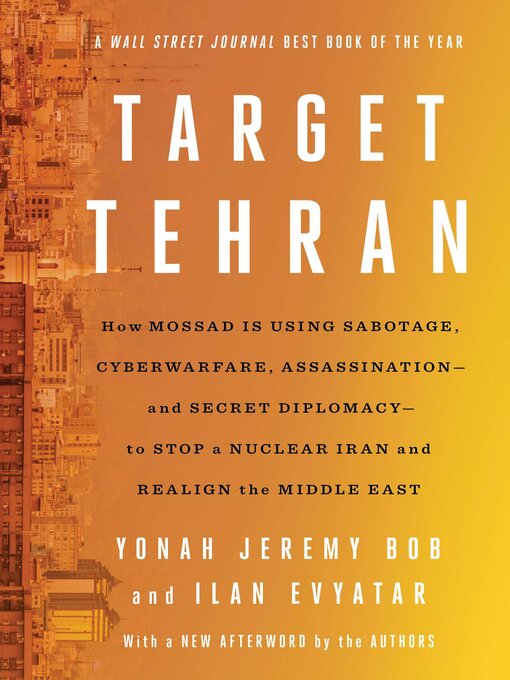Target Tehran
How Israel Is Using Sabotage, Cyberwarfare, Assassination – and Secret Diplomacy – to Stop a Nuclear Iran and Create a New Middle East
Winner of the Jewish Book Council's Natan Notable Book Prize
"One of the most accurate and fascinating books so far" (Michael Bar-Zohar, coauthor of Mossad) about how Israel used sabotage, assassination, cyberwar—and diplomacy—to thwart Iran's development of nuclear weapons and, in the process, begin to reshape the Middle East.
Yonah Bob and Ilan Evyatar describe how Israel has used cyberwarfare, targeted assassinations, and sabotage of Iranian facilities to great effect, sometimes in cooperation with the United States. Even as it takes lethal action, Israel has managed to alter the politics of the Middle East, culminating in the Abraham Accords of 2020. Arab states such as Bahrain and the United Arab Emirates normalized relations with Israel, and the holy grail of normalization with Saudi Arabia may yet be achieved. Despite the war with Hamas, these Arab states share Israel's concern with Iran, remaining silent while Israel undermines Iran's nuclear program.
Bob and Evyatar reveal how Israel has used documents stolen from Tehran in a daring, secret Mossad raid to show the United States and the International Atomic Energy Agency how Iran has repeatedly violated the 2015 JCPOA nuclear agreement and lied about its active nuclear weapons program. Drawing from interviews with top confidential Israeli and US sources, including from the Mossad and the CIA, the authors tell the "thrilling" (Lt. Gen. H.R. McMaster, author of Battlegrounds) inside story of the tumultuous, and often bloody, history of how Israel has managed to outmaneuver Iran—so far.
-
Creators
-
Publisher
-
Release date
September 26, 2023 -
Formats
-
OverDrive Read
- ISBN: 9781668014585
-
EPUB ebook
- ISBN: 9781668014585
- File size: 17311 KB
-
-
Languages
- English
-
Reviews
-
Publisher's Weekly
June 26, 2023
Jerusalem Post journalists Bob and Evyatar survey in their vigorous debut outing Israel’s 20-year clandestine war against Iran’s nuclear program. Among other episodes, the authors detail several bombings of the Natanz uranium-enrichment plant (in 2021, the Israelis managed to embed explosives in the plant’s foreign-supplied equipment before it was shipped to Iran); the Stuxnet computer-worm attack that wrecked hundreds of enrichment centrifuges at Natanz, first detected by the Iranians in 2010; numerous assassinations of Iranian nuclear scientists; and the 2018 theft of an archive detailing secret Iranian nuclear activities, which helped President Trump justify abrogating the Iranian nuclear treaty negotiated by the Obama administration. As a complement to the cloak-and-dagger, Israel also waged a patient campaign to forge closer ties with Sunni Arab countries that feared Iran’s nuclear ambitions, culminating in the 2020 Abraham Accords normalizing relations with the United Arab Emirates and Bahrain. Drawing on interviews with Mossad officials, the authors’ well-paced narrative steeps readers in intricate spy craft and high-wire diplomacy, making these events feel like a true-life James Bond mission that’s carefully calibrated to shape American foreign policy and Middle East geopolitics. The result is an engrossing look at one of the most effective covert-ops projects of recent times. -
Kirkus
Starred review from July 15, 2023
Two respected journalists delve into Israel's moves to counter Iran's nuclear gambit. The Middle East has long been a labyrinth of age-old grudges and ever shifting allegiances. In the past two decades, Iran has emerged as a player with nuclear ambitions, prompting Israel to think of the nation as one of its major enemies. Bob and Evyatar, both contributors to the Jerusalem Post, have deep connections to Israel's security agencies and government processes, and they begin their book with Mossad's theft of a truckload--literally--of documents from Iran's nuclear archive in 2018. The material provided proof that the country had been systematically violating a range of treaties and agreements but also indicated how far Iran was prepared to go to attain nuclear capability. Israel's response was a multitiered campaign, combining cyberwarfare, sabotage, airstrikes, drones, and assassinations. The authors fill out the details through interviews with numerous Mossad officers, but the most important change, they suggest, might turn out to be the willingness of several Arab states to reconsider their attitudes toward Israel. Growing Iranian belligerence toward everyone in the region made some level of acceptance start to look desirable, and a series of secret meetings took place. The outcome of these moves was the U.S.-sponsored Abraham Accords, which have evolved into a broad framework for cooperation. The problem is that Iran shows no sign of shelving its nuclear plans. It has become better at hiding and protecting assets and is building cyberwarfare and drone weapons of its own. "The Mossad's secret war is not over," write the authors. "Indeed, it may never end." It is a sobering conclusion, but it is hard to see any alternatives. Throughout this remarkable narrative, the authors provide valuable context to the new Middle East picture. Built on meticulous, diligent research, this book is key reading for those interested in geopolitical issues.COPYRIGHT(2023) Kirkus Reviews, ALL RIGHTS RESERVED.
-
Loading
Why is availability limited?
×Availability can change throughout the month based on the library's budget. You can still place a hold on the title, and your hold will be automatically filled as soon as the title is available again.
The Kindle Book format for this title is not supported on:
×Read-along ebook
×The OverDrive Read format of this ebook has professional narration that plays while you read in your browser. Learn more here.


